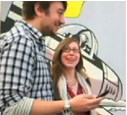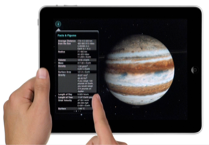Community Embraces New Word Game at Mid-Year Play Day This past Sunday, families at Takoma Park’s Seventh Annual Mid-Year Play Day had the opportunity to experience OtherWordly for the first time. Our educational language game drew curious children and parents to our table throughout the afternoon. Words in Space Several children gathered around our iPads […]
Read moreTag: apps
 Games on mobile devices are a new way to engage museum visitors. Two companies gave presentations at yesterday’s Museums & Mobile 2011 online conference.
Games on mobile devices are a new way to engage museum visitors. Two companies gave presentations at yesterday’s Museums & Mobile 2011 online conference.
One popular type of game is a miniature scavenger hunt, called “location-gaming.” The premise is that players go places (e.g., a restaurant or park), do fast, simple tasks (like typing something into their phone, or uploading a photo of something), and win a reward (the reward can virtual “points,” or something tangible, like a free postcard or sandwich). Other types of games are more thematic, such as creating playing-card “battles” between characters that appear in art. (more…)
 Museums are going mobile, and many companies are eager to help. At yesterday’s Museums & Mobile 2011 online conference, several vendors promoted their wares. This is a summary of products, approaches, and some alternatives… (more…)
Museums are going mobile, and many companies are eager to help. At yesterday’s Museums & Mobile 2011 online conference, several vendors promoted their wares. This is a summary of products, approaches, and some alternatives… (more…)
 Small differences have a big effect when trying to coax thousands or millions of people. This includes urging online readers to take an action. This post looks at how IDEA used small ads on one of our projects (a small, free web-based exhibit about Daylight Saving Time) to promote another project (a 99¢ app about Daylight Saving Time sold via the Apple app store). This post looks at statistics and ratios… (more…)
Small differences have a big effect when trying to coax thousands or millions of people. This includes urging online readers to take an action. This post looks at how IDEA used small ads on one of our projects (a small, free web-based exhibit about Daylight Saving Time) to promote another project (a 99¢ app about Daylight Saving Time sold via the Apple app store). This post looks at statistics and ratios… (more…)
 On the screens of millions of iPad and other mobile devices, moons and stars, elements and molecules swirl beneath our fingertips. Developer Mike Howard says he wants to “make you feel like you are actually there in orbit.” Theodore Gray wants you to look at the periodic table and be transported to the world of Harry Potter, feeling as “if you checked out a magical version of The Elements from the Hogwarts library.”
On the screens of millions of iPad and other mobile devices, moons and stars, elements and molecules swirl beneath our fingertips. Developer Mike Howard says he wants to “make you feel like you are actually there in orbit.” Theodore Gray wants you to look at the periodic table and be transported to the world of Harry Potter, feeling as “if you checked out a magical version of The Elements from the Hogwarts library.”
Apps represent a shift in how students and the public learn about science. Currently, the best science apps are not being created by museums, traditional publishers, or curriculum developers — They are being created by enthusiastic solo developers, research centers, and new software companies with a penchant for science and public education. We’ll look at what motivated these app creators, what it took to make the apps, and how successful they have been. (more…)

